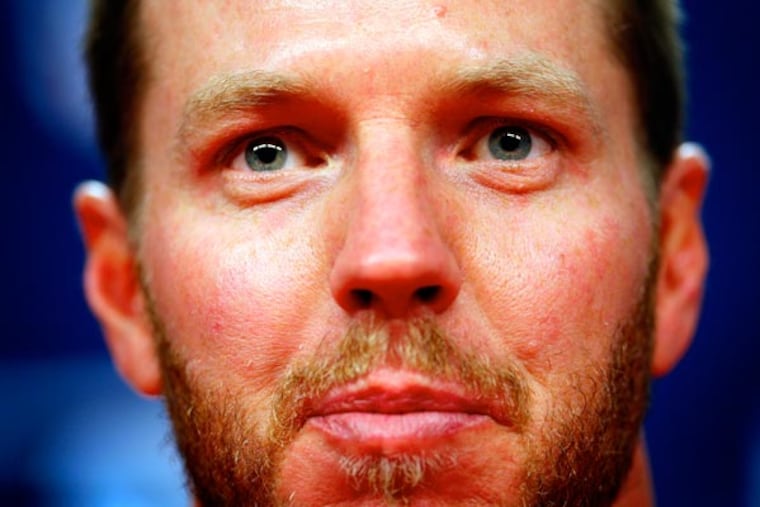Roy Halladay’s death, the heroes we think we know, and the questions we don’t often ask | Mike Sielski
A recent Sports Illustrated article raised the possibility that Halladay, the former Phillies great, committed suicide. What does it mean if he did?

When it was time for him to talk with me about Roy Halladay’s death, Bill Davis did so in an aseptic conference room inside the headquarters of the Pasco County (Fla.) Sheriff’s Office. Davis is the commander of Pasco County’s juvenile investigative division, and he was close with Halladay. They fished together. They flew together. I was there, in February of last year, to write about the day that Halladay’s plane had crashed into the Gulf of Mexico, to ask Davis about the friend he’d lost less than four months earlier, and the conference room seemed an odd, almost inappropriate, place to do it.
When you have to ask such sensitive questions, you want the interviewee to be as comfortable as possible — in a familiar restaurant, in a coffee shop, in the privacy of his or her office or home. The conference room was formal, cold. I chalked it up to convenience — Davis must have had only so much time to spare. In retrospect, I wonder if he needed that formality, that sterile setting, to help keep his own emotions and questions at bay. I wonder if he is asking those questions now.
They are the same questions that Halladay’s family members have been asking themselves, the same questions that an article this week in Sports Illustrated raises, just days before Halladay’s posthumous induction into the National Baseball Hall of Fame. The story’s revelations are stark: Halladay, after pitching his final game for the Phillies in 2013 and retiring from baseball, lost part of his identity without the sport. He had felt withering pressure — some of it from his father, some of it self-imposed — his entire life. He was aware at all times of his fame and feared that he could not live up to the image that he presumed people had of him. He was likely clinically depressed. He twice went to rehab because of an addiction to painkillers. He had enough amphetamines in his system at the time of his death — while he was in the air, behind the controls of his ICON A5 — that “the concentration … alone could have killed him.”
The article is more than 4,700 words in length, and one word in particular does not appear in it: suicide. For much of the piece, the writer, Stephanie Apstein, does what writers do: She leads the reader to consider the word, the notion, without having to use or raise it explicitly herself. Then, quite bravely, she does raise it, to Halladay’s father.
Did he take his own life? He was planning for the future: a second home in Denver, more time together. But depression is a powerful disease. “I don’t know,” Big Roy says. … “I’ve kind of come to the conclusion that I don’t need to know exactly why. I just know that it did happen. And I’m not going to investigate it anymore, because the more you get into it, the more grief you can cause yourself.”
Does it matter whether Halladay killed himself? If he did, should it change the way we think about him, his career, his perfect game, his postseason no-hitter, his 203 victories, his two Cy Young Awards, the esteem in which his peers held him, his consistent pursuit of and attainment of excellence? I can’t pretend to know. It feels like a dereliction of duty to admit such a thing: Come on, Mr. Columnist. This is your job. Have a take. Take a stand. But these seem to be questions that one can answer only for himself or herself.
There is a part of me, a significant part, that grows angry at the mere thought of what he did that day. Roy Halladay was a husband and a father of two boys, as I am, and the notion that he could abdicate his responsibilities to them, that he could cause them such pain — that, even if the crash was accidental, he could risk causing them such pain — strikes me as so selfish as to be depraved. And there is another part that looks for a clear line where the anger stops and the mercy begins, where you remind yourself that it’s rare to know what is troubling, and what most troubles, someone else’s mind and heart. The strength and confidence and competence that a person displays, that make a person famous and admired, might be a facade.
Bill Davis left no doubt about where he came down on these questions. He spent our 90 minutes together seated at a long table, with his elbows atop it and his hands clasped in front of his face, as if he were praying. "I knew Roy away from baseball,” he said. “I knew him as the family man, as the father, as the friend. I had the pleasure of being able to make Roy laugh. I got to share in the laughter and being a father, talking about everything but baseball — kids growing, having those father conversations and those husband conversations, blessed to have him as a friend. I know so many people knew him as Roy Halladay, the Cy Young Award winner. I knew him as Roy.”
I wonder now if he really did. I wonder if anyone knew Roy Halladay at all.